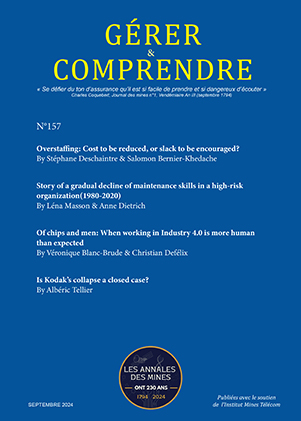| |

|
|
N° 157 - Septembre 2024
Of chips and men: When working in Industry 4.0 is more human than expected
By Véronique Blanc-Brude
PhD candidate at Université Grenoble Alpes, Grenoble INP, CERAG, 38000 Grenoble, France
and Christian Defélix
Professor at Université Grenoble Alpes, Grenoble INP, CERAG, 38000 Grenoble, France
In order to address the challenges of efficiency and manufacturing quality, the high levels of automation and data integration that characterize Industry 4.0 make it possible to produce customized runs at a similar cost to mass production, which leads to the creation of vibrant and complex work situations. In “flow” industries, such as microelectronics, very real human work becomes less visible as it only occurs in the event of a flow or process interruption. But what exactly are the consequences of this automation, pushed to its maximum, on the work and the skills required for production operators? This paper is based on an industrial case study, where the search for high performance levels and the increase in automation lead to increased monitoring of anomalies. The theoretical framework chosen is that of invisible work and its threefold experience (Gomez, 2013), which allows us to discover a change in work that is not really considered by the official organization. Thanks to a qualitative approach combining direct observation and semi-structured interviews, this research reveals that the work experience is marked by a ballooning objective dimension, a far cry from the most frequent, flattering presentations of Industry 4.0. A collective, non-official component is still necessary, with many interactions. Lastly, the subjective experience reveals many areas of tension. Thus, “4.0” work, even if it is more automated, turns out to be much more human than expected.
 Télécharger gratuitement l'article Télécharger gratuitement l'article
 Retour au sommaire Retour au sommaire
|
|




